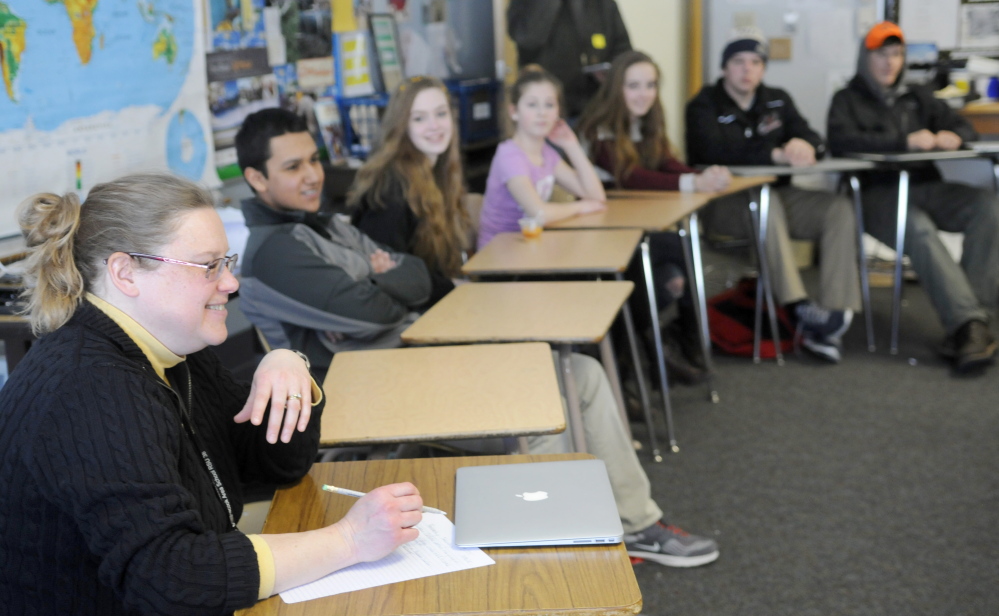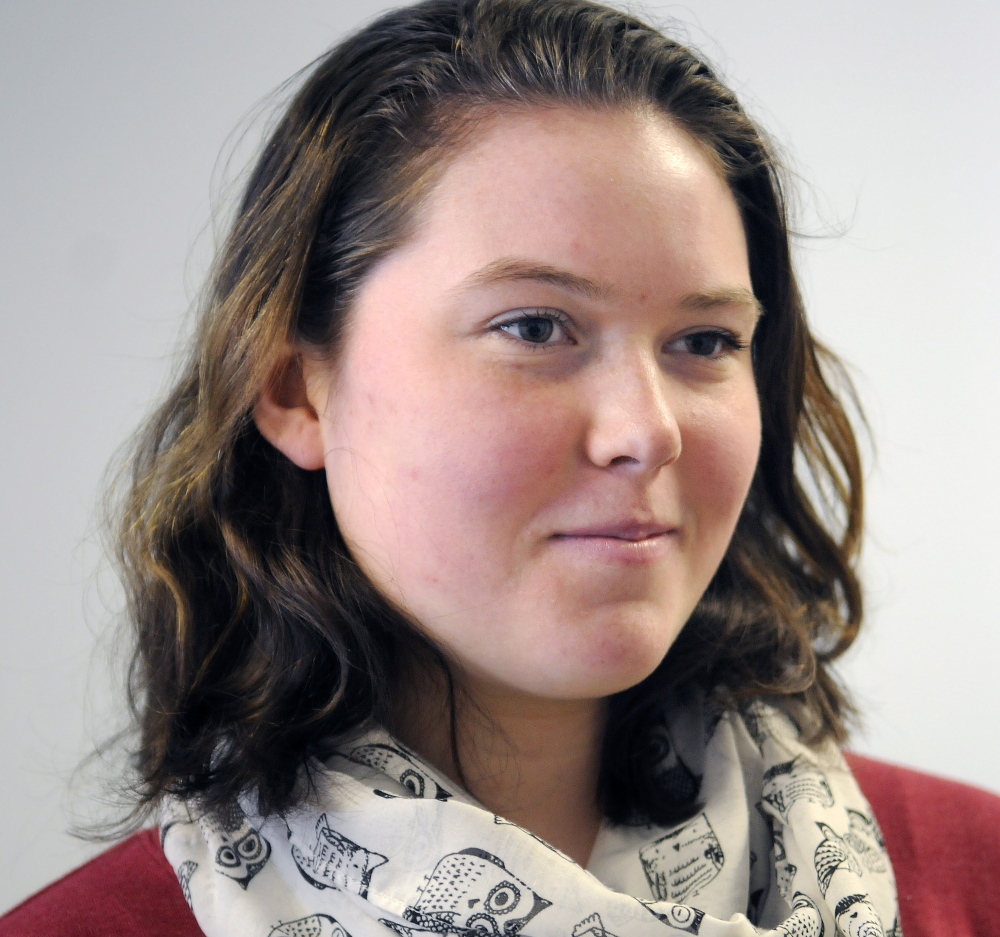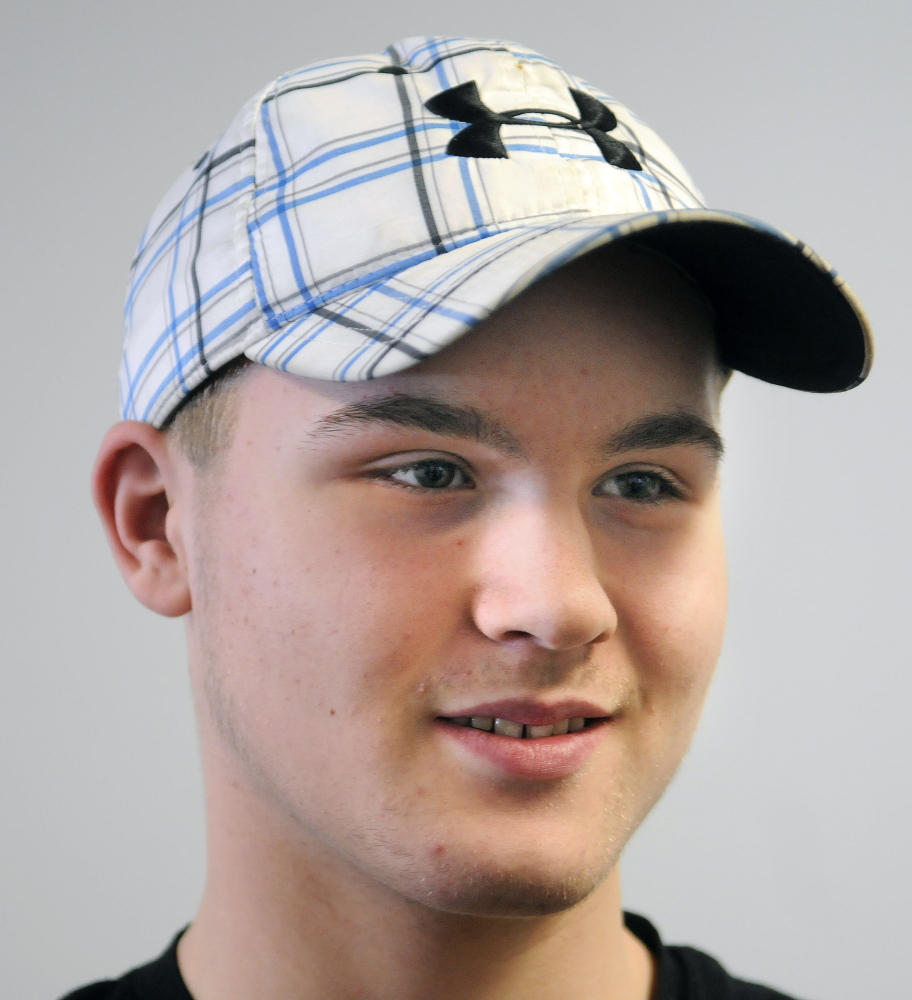READFIELD — Stereotypes are like bad hair days. Nobody wants them to happen, but we all have them. They can sneak up on us when we least expect it and affect how we view the world around us.
“I know I stereotype a lot,” said 17-year-old Kaitlyn Chick, of Readfield. “I try not to follow them, but I know they’re in my mind.”
Admitting they exist is the first step to loosening the grip stereotypes have on our worldviews, but Maranacook Community High School social studies teachers Carrie Emmerson and Pat Stanton hope freshmen in their Global Explorations class will go beyond recognizing the problem and learn to correct it.
Toward that end, the teachers last week took students from the class, along with a few select seniors, to take part in Operation Breaking Stereotypes, a workshop that allowed students to interact with people and cultures both different from their own and yet surprisingly similar.
“As we do not have a lot of diversity at our school, we are taking our students to the diversity,” Emmerson said. “I think it’s a lot more powerful when they get to actually interact with people from different cultures than it is to talk about it in the abstract.”
The daylong event in Lewiston featured a number of presentations, including opportunities to hear from representatives of the Jewish, Muslim and Catholic faiths. Students from Lewiston High School, including those from the Somali community, as well as from the School for Democracy and Leadership in Brooklyn, N.Y., also took part in the event.
Operation Breaking Stereotypes, according to the nonprofit’s website, works with schools in Maine, Boston and New York “to help students address ethnic, socio-economic, gender, and racial stereotypes through writing, reading, music, photography, and personal connections.” The program establishes long-term connections between schools and facilitates multi-day exchanges.
In addition to the relationship between Lewiston High School and the Brooklyn, N.Y., school, Operation Breaking Stereotypes has made connections between Mount Desert Island High School in Bar Harbor and Bronx Academy of Letters in New York and between Searsport High School and Boston Green Academy in Massachusetts.
Maranacook students were invited to take part in last week’s session at Lewiston High School.
Freshman Robbie Allen, of Manchester, said he was affected by just listening to the Islamic leader, who spoke through a translator.
“It was pretty cool, actually, when you heard the Somali language,” Allen said.
Hearing the language spoken was just one of the rare opportunities to interact with and get to know people from various cultures, said freshman Ariana Wiles, of Manchester. She was interested in hearing about what the presenters believe and why they believe it. Wiles said part of what she learned is that respecting differences in another does not mean backing down from one’s own convictions. For instance, Wiles said, the Catholic presenter, like Wiles, believes in one God, but there are differences in the books of the Bible both study and how that Bible is interpreted.
“She doesn’t necessarily believe the same as I do, but she has similarities,” Wiles said. “It was nice to hear a different perspective, but I also had to remind myself that I believe something different.”
Senior Abby Westberry, of Readfield, said she was interested in learning more about the Islamic faith. She appreciated the chance to hear how the three people of different faiths view current worldwide events.
“The Jewish man talked about his own beliefs in regards to Israel and Palestine,” Westberry said. “The Islamic priest talked about their opinions on terrorism and the media’s perspective of Muslims these days.”
Though Maranacook, like other rural Maine schools, is marked by largely homogeneous culture and experiences, the students said they still have experience with various forms of stereotyping. Students in advanced placement classes, for example, are viewed different than those who take industrial arts. Soccer players are viewed differently than students involved in drama.
Senior Johan Nel, of Wayne, said he spent the first three years looking at people in groups and using those stereotypes to guide his social interactions. He now regrets the opportunities he missed to get to know others.
“It really wasn’t until this year that I’ve realized a lot of that stuff doesn’t really exist,” Nel said. “The more those break down, the more we realize we are similar. We’re noticing you’re not that bad. You’re not who I thought you were. It’s weird it’s taken four years.”
Freshman Nicole D’Angelo, of Readfield, said the key to combating those stereotypes is getting to know people and learning who they are as individuals. She said most people could fit into multiple, disjointed categories, which leads to generalizing and stereotyping.
“I think we’re prone to it because it’s easier for everybody,” D’Angelo said. “You don’t have to take into account their feelings, what they think or anything that they do. You can just generalize and pass quicker judgment. You don’t have to think as hard.”
Chick said the day helped erase the stereotypes she held heading into the conference. She was struck by the ideals of community charity and giving held by all three people of faith.
“That was interwoven through all of them, which are great qualities to have,” Chick said. “They’re just normal people.”
Freshman Ben Tyler, of Manchester, who described the experience as “mind opening” and “amazing,” said he expected the seminar to be like lots of others at the school: interesting but soon forgotten.
“Now that I know these things about these people, it doesn’t seem real that people would think about them in another way,” Tyler said. “If you don’t know the people personally, you don’t know where they’re coming from. You don’t know how they act. You hear bad things about them. That’s the only thing you know. That’s what you’re going to tell people, that this is how they act and this is how they are, when you really have no idea how they act or are, because you still haven’t seen their point of view or seen where they come from.”
Stanton said she is pleased to hear the students talking about what they learned, but application is an ongoing process.
“Kids will say things, but then living it takes a while,” she said.
Emmerson said she hopes the students learn to engage in civil discourse even when confronted by beliefs and views vastly different from their own.
“The more opportunities we can have to interact and celebrate our differences and how that makes us stronger instead of focusing on what separates us, I think will make us a stronger society,” Emmerson said. “That’s how democracy works.”
Craig Crosby — 621-5642
Copy the Story LinkSend questions/comments to the editors.





Success. Please wait for the page to reload. If the page does not reload within 5 seconds, please refresh the page.
Enter your email and password to access comments.
Hi, to comment on stories you must . This profile is in addition to your subscription and website login.
Already have a commenting profile? .
Invalid username/password.
Please check your email to confirm and complete your registration.
Only subscribers are eligible to post comments. Please subscribe or login first for digital access. Here’s why.
Use the form below to reset your password. When you've submitted your account email, we will send an email with a reset code.